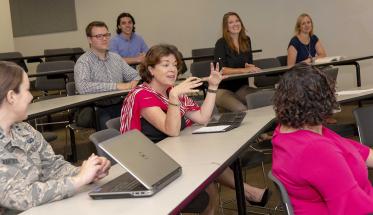For years, the Foisie Business School’s MBA program has successfully helped professionals elevate their careers.

Fabienne Miller (left) and Sandra Wellinghoff worked together
in developing the new curriculum to redesign WPI’s
STEM MBA.
Despite a robust technical skill set, some STEM professionals weren’t as adept at business tasks, such as managing human and financial resources. With business and technology so interconnected, FBS faculty knew today’s leaders must understand enough of both to become successful in either realm. They redesigned the MBA curriculum to help technically trained professionals round out their skill set and address the areas that were noted for improvement. The result is a distinctive MBA program for STEM professionals.
The Daily Herd recently sat down with associate professor and MBA program director at Foisie Business School Fabienne Miller, to understand what makes WPI’s STEM MBA different from other programs.
What spurred an MBA program for STEM professionals?
Being part of WPI, it was important to us to build on the strengths of the university and propose a degree for STEM professionals. We thought we had a STEM-focused MBA before, but when we looked at it, it wasn’t as STEM-focused as we wanted.
Our current students said they knew we were unique, but people in the larger community do not know that we are different. We had to decide if we should change what we are doing and, if so, decide how we communicate that.
When you stepped back and looked at it all, what did you want to change or alter?
Initially we didn’t know, because we thought we were doing fine. But we did a market study and found our current students weren’t always getting as much of our STEM focus as we wanted them to get.
We talked to all our stakeholders starting with employers, primarily the largest employers of WPI students. Even if we are not just targeting WPI students, they are the prime example of the students we want, STEM-focused professionals. With the help of the CDC, we talked with our customers—students, employers, and alumni—and used their feedback to build the revised MBA.
Which areas changed the most?
We have increased the focus of the program on soft skills and financial decision making, the areas that STEM professionals are often weak in when they move into business and managerial roles. Employers are telling us STEM professionals have strong technical skills, but the challenges they experience working with people at different levels of the organization or from different backgrounds can render communication difficult and can be costly for organizations.
Employers stressed that this is less of a problem for WPI students because they work so well in teams. But other STEM professionals aren’t used to that. They don’t have the benefit of project-based learning. So we adjusted the curriculum around that and revised the content of organizational behavior courses related to interpersonal skills, power, and leadership. Additionally, even WPI alumni can benefit from additional skills to navigate dynamic organizations. We are now asking students to round out their soft skills with a course in negotiation or leading change.
The other sector we heard about was on the financial side, which is something the alumni and students didn’t mention too much, but employers all did. STEM professionals often don’t know how to plan and manage resources. It could be someone who is proposing to make changes to the design of a product but doesn’t understand the implications related to the costs of the changes or somebody who needs to identify the resources to be deployed for a new project. Planning and managing resources add to the complexity of the projects. To help students build those financial skills, we added a foundation course and an applied course that will enable students to model and work with the financial tools they have learned.
What surprised you?
Because my area is accounting, I always believed that was important. So did members of the Dean’s Board of Advisors and recruiters of WPI students with an engineering background or a STEM background. They say they knew the technology piece but they had to learn the finance piece the hard way and sometimes made costly mistakes. However, I am surprised that prospective and even current students did not realize the importance of finance.
What does WPI offer that other schools don’t offer?
In MBA programs, a lot of schools might focus on a sector—for instance, healthcare—or offer a general MBA. But there’s no school we could find that focuses on the skills needed by STEM professionals while offering them a flexible program with high faculty involvement.
The few programs we did find that have a STEM focus are different because they take students right away, right after they earn their undergraduate degree. We don’t. We want experienced professionals. We work with a lot of business cases, not textbook exercises. It’s about learning from experience and applying new skills. If you don’t have that experience to bring in, it makes it difficult to contribute to the class and to learn from each other.
We also want to make sure we are flexible in the program delivery. That’s why we have the blended program where students can take classes online while coming to campus several times a semester to interact and network.
How is making that connection between business and technology crucial to success and to innovation?
This complements the training people have had and it enables them to move up in an organization.
As someone at WPI, it’s obvious to me that business and technology go together. Technology without business does not make much sense and business by itself, if you don’t understand your product, that’s not good enough. The best person to sell a project is the person who understands it. Innovation needs to get beyond patents; you need to be able to commercialize innovation and understand business. Also, innovation happens in many forms and understanding organizations better can foster innovation.
How is this approach comprehensive?
Strategy is what’s driving business, what’s giving direction to business, so we organized the courses around strategy. We are using the approach of Plan/Do/Check/Act, which is not unique but for us it’s important because it pulls all the courses together. Before, some faculty and students felt that courses were somewhat disjointed. This aligns the curriculum and encourages us to work across disciplines. It’s looking at the big picture, and we want students to understand the complexity of the business issues they are facing, so they don’t have just one lens when trying to solve a problem.



